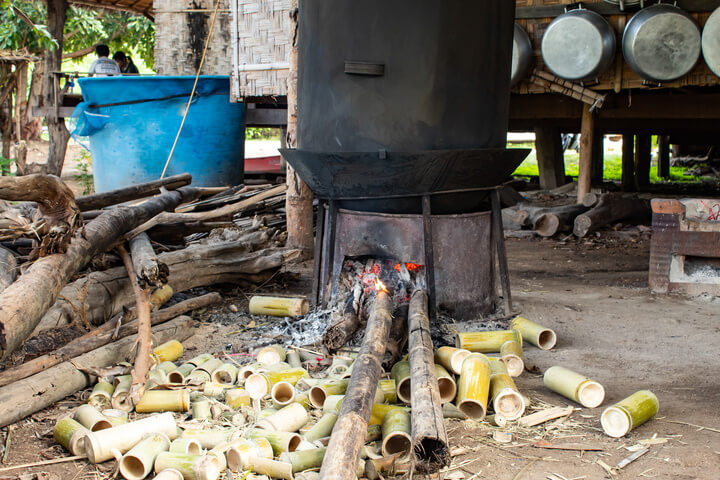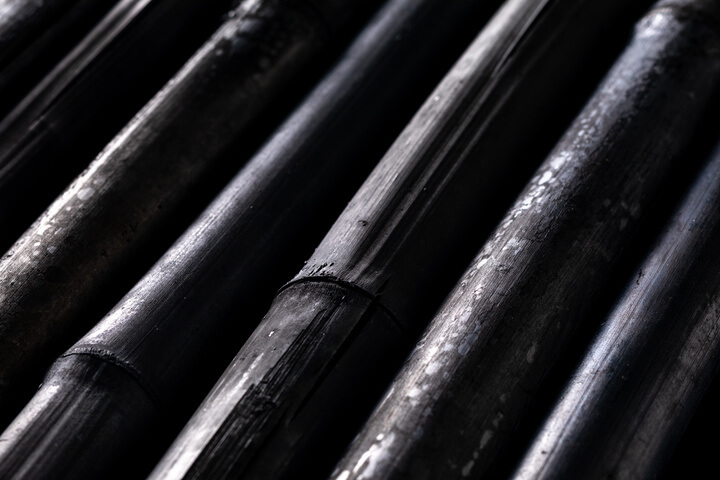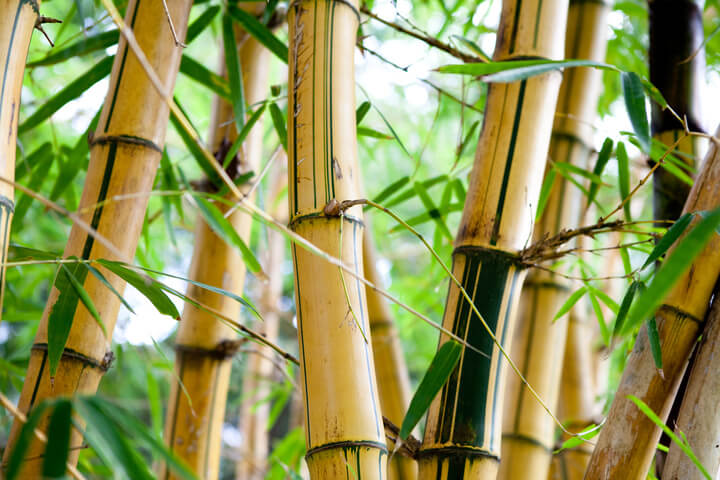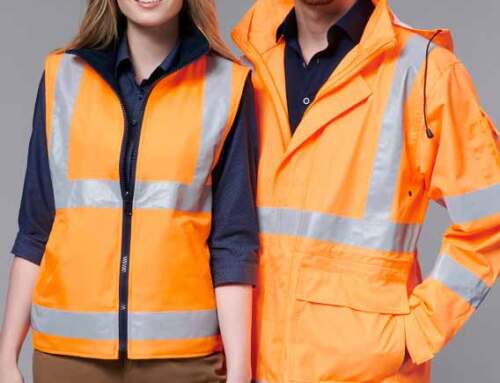Ever heard of bamboo charcoal? It’s been around for hundreds of years in East Asian countries and used for everything from cooking fuel to medicine, but lately, it has emerged as a frontrunner in the clothing industry due to its versatility and sustainable, eco-friendly properties.
Why is it so popular? Bamboo charcoal fabric is sustainably produced, antibacterial, odour absorbing, moisture absorbing, and environmentally friendly. Plus as an added bonus, it offers the same feel and durability as existing synthetic fabrics – it looks as though this emerging trend in the fashion industry is here to stay!
How Is Bamboo Charcoal Made?
Bamboo charcoal fabric is made by burning bamboo plants at very high temperatures (over 800˚C) to form a charcoal substance. This charcoal is then processed further to form very tiny nanoparticles, which are then embedded into other fibres such as cotton and polyester.
These fibres are then used to manufacture bamboo charcoal fabrics used in all kinds of applications across the fashion industry, from polo shirts and hoodies through to nappies and underwear.

Is Bamboo Charcoal Fabric Breathable?
Because bamboo fibres are physically rounded and porous, charcoal bamboo fabric naturally allows greater circulation of air. The amount of breathability of the final garment will, of course, depend on the fabric that it has been blended with.
It is this ability to breathe that contributes to the popularity of bamboo charcoal fabric as in fashion garments it allows for far greater comfort and moisture control for the wearer.
What Is Bamboo Charcoal Used For?
Bamboo charcoal is prized for its odour and moisture-absorbing properties as well as insulation and purification abilities which makes it an excellent choice across a wide range of industries and applications.
Here are just some of the uses for bamboo charcoal:
- Construction Materials. Flooring, wall and ceiling linings.
- Clothing. Socks, underwear, polo shirts, hoodies, tee shirts, singlets, hats, vests – pretty much everything!
- Cooking Fuel. Bamboo charcoal is more efficient than wood for burning.
- Skin Care. Infections, cleansing, anti-fungal applications and many more.
- Medicinal Reasons. Treatment of diarrhoea, poisoning, or indigestion
- Water Purification. The porous nature of bamboo charcoal draws impurities out of water.
- Homewares. Sheets, towels, bedding, carpets etc.
- General Health. Absorbs toxins, detoxifies, aids kidney function and gastrointestinal issues.
How Does Bamboo Charcoal Work?
The key to why bamboo charcoal is so highly functional is that it is naturally very porous. Its expansive surface area is covered in millions of holes or pores that trap and hold pollutants, toxins, moisture and other tiny particles.
Where bamboo charcoal is often referred to as “absorbent”, in actual fact, the term “adsorbent” is the correct way to describe it. Adsorbent means it works by attracting particles trapping them in its tiny pores; this differs from absorption which is when two substances join together without any specific attraction.
These adsorbent properties of bamboo charcoal make it a great tool for purifying water and air, and for removing toxins from the body. From a clothing manufacturing perspective, the porousness of bamboo charcoal garments means they are better able to resist unpleasant odours, heat retention is increased, along with breathability, and it can even neutralise electromagnetic radiation and absorb UV rays.

Why Bamboo?
There are three main reasons why the popularity of bamboo has increased in recent years; the first is that bamboo grows very, very fast. It only takes about five years to grow to an acceptable size where it can be harvested. And after harvesting, it can grow back without being replanted or cultivated.
Secondly, bamboo clothing is naturally environmentally friendly and fully biodegradable. It can be grown and replenished without producing any pollutants or impacting the environment. What’s more, bamboo produces more oxygen than regular forest trees and can help lower nitrogen levels in rivers and streams. Plus, it helps reduce carbon dioxide gases that are responsible for global warming!
And last but not least, for clothing manufacture and fabric production, bamboo has proven to be the perfect choice for combining with other fibres to create softer, gentler fabrics that are more durable, odour resistant and economical.
11 Benefits Of Bamboo Charcoal Fabric
By now you have likely realised just how great bamboo charcoal is, but just in case you haven’t, here are the top 11 benefits of charcoal bamboo when used in fabrics.
- Naturally Antibacterial And Anti-fungal. The natural antibacterial and anti-fungal properties of bamboo charcoal effectively decompose micro-organisms that attach to its surface as well as in the surrounding air.
- Actively Deodorises. The highly porous nature of bamboo charcoal means it readily absorbs odours and deodorises fabrics, making them great for use in products next to the skin.
- Absorbs Excess Moisture. Bamboo charcoal absorbs sweat and moisture from the body, providing dryer, more comfortable clothing that does not cling to the skin.
- Highly Durable. Because bamboo charcoal is embedded into the fibres of the garment, it is much more durable than if it were coated on the surface. This means repeated washing will not reduce the effectiveness of the fabric.
- Improves Insulation Properties. Charcoal bamboo has been found to increase the insulating properties of the fabric it is embedded in as the highly porous nature acts as an insulator trapping air and providing a barrier against the cold while also retaining heat within its pores.
- Improves Blood Circulation. By absorbing infra-red rays from the environment, bamboo charcoal’s nanoparticles can pass them on to the body, improving blood circulation and metabolism.
- Hypoallergenic. Bamboo charcoal is produced without the use of chemicals, pesticides or insecticides, so it is great for those with sensitive skin and allergies.
- Anti-Pilling. Bamboo charcoal embedded fibres are more resistant to pilling than straight polyester, and static electricity is reduced.
- Highly Breathable. Compared to conventional fabrics bamboo charcoal offers better moisture absorption and ventilation – either adding to or improving the breathability of existing fibres such as cotton or polyester.
- Environment Friendly. Bamboo clothing is naturally environmentally friendly right from when it is first grown through to the production of bamboo charcoal, as well as being fully biodegradable at the end of its useful life.
- Provides UV Protection. Bamboo fabric does offer some UV protection with reports of as high as 98% of harmful UV rays excluded when produced for this purpose.

Interested in sourcing sustainable, eco-friendly bamboo charcoal workwear or clothing? Get in touch with the team at Big Branding to discuss your requirements today.





